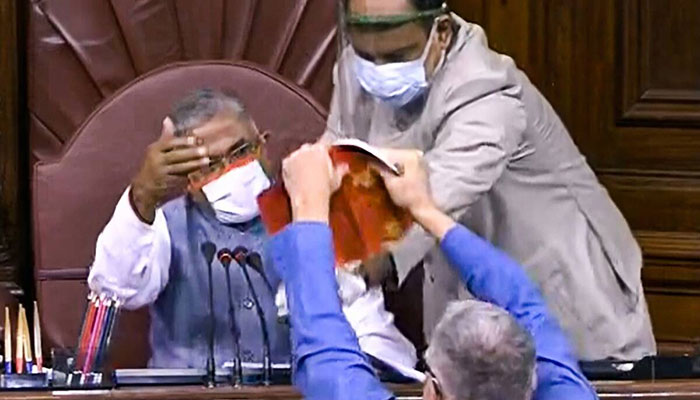Spying through Pegasus: Ruckus in Indian parliament
NEW DELHI: The Indian parliament was disrupted for the second day running on Tuesday by noisy opposition calls for an investigation into reports of snooping on politicians and others with Israeli-made spyware Pegasus.
The parties, led by the main opposition Congress, shouted slogans and raised ruckus in both houses of parliament that had reconvened Monday after being cut short in March due to the coronavirus pandemic.
Shaktisinh Gohil, a Congress spokesman, said Prime Minister Narendra Modi´s government should clearly say whether it used Pegasus to spy on dozens of politicians, journalists, activists and critics.
"If yes, then the government should order a joint parliamentary committee probe to investigate the entire matter," he told reporters here. The Congress also demonstrated in the heart of the capital before police intervened and detained several protesters.
Carrying banners, toy binoculars and magnifying glasses, the demonstrators accused the ruling party of ordering the hacking of smartphones. More than 1,000 Indian phone numbers were among tens of thousands worldwide selected as possibly of interest to clients of NSO Group, maker of the Pegasus spyware, according to an investigation by a group of media outlets.
The identities behind around 300 of the numbers were verified by the international consortium of media outlets and included Modi´s main political rival, Rahul Gandhi of Congress. Others included Indian politicians, journalists, activists and government critics, as well as India’s newly appointed IT minister Ashwini Vaishnaw.
Also reported to be on the list was a woman who made sexual harassment allegations against India´s former chief justice, as well as Tibetan Buddhist clerics, Pakistani diplomats and Chinese journalists.
It is not known how many of the phones on the list were actually targeted for surveillance or how many attempts were successful, according to the Washington Post, which was part of the joint international investigation. But forensic analyses performed on 22 smartphones in India with numbers on the list showed that 10 were targeted with Pegasus, seven of them successfully, reports said.
The Indian government denied the allegations, with Home Minister Amit Shah saying they were aimed to "humiliate India at the world stage" and "derail India´s development trajectory". Critics say India should state whether or not it had licensed the spyware from NSO. The government says any surveillance is done in accordance with strict rules and oversight.
-
 King Charles' Andrew Decision Labelled 'long Overdue'
King Charles' Andrew Decision Labelled 'long Overdue' -
 Timothee Chalamet 'forever Indebted' To Fan Over Kind Gesture
Timothee Chalamet 'forever Indebted' To Fan Over Kind Gesture -
 Columbia University Sacks Staff Over Epstein Partner's ‘backdoor’ Admission
Columbia University Sacks Staff Over Epstein Partner's ‘backdoor’ Admission -
 Ozzy Osbourne's Family Struggles Behind Closed Doors
Ozzy Osbourne's Family Struggles Behind Closed Doors -
 Dua Lipa Claims Long-distance Relationship 'never Stops Being Hard'
Dua Lipa Claims Long-distance Relationship 'never Stops Being Hard' -
 BTS Moments Of Taylor Swift's 'Opalite' Music Video Unvieled: See Photos
BTS Moments Of Taylor Swift's 'Opalite' Music Video Unvieled: See Photos -
 Robin Windsor's Death: Kate Beckinsale Says It Was Preventable Tragedy
Robin Windsor's Death: Kate Beckinsale Says It Was Preventable Tragedy -
 Rachel Zoe Shares Update On Her Divorce From Rodger Berman
Rachel Zoe Shares Update On Her Divorce From Rodger Berman -
 Kim Kardashian Officially Takes Major Step In Romance With New Boyfriend Lewis Hamilton
Kim Kardashian Officially Takes Major Step In Romance With New Boyfriend Lewis Hamilton -
 YouTube Tests Limiting ‘All’ Notifications For Inactive Channel Subscribers
YouTube Tests Limiting ‘All’ Notifications For Inactive Channel Subscribers -
 'Isolated And Humiliated' Andrew Sparks New Fears At Palace
'Isolated And Humiliated' Andrew Sparks New Fears At Palace -
 Google Tests Refreshed Live Updates UI Ahead Of Android 17
Google Tests Refreshed Live Updates UI Ahead Of Android 17 -
 Ohio Daycare Worker 'stole $150k In Payroll Scam', Nearly Bankrupting Nursery
Ohio Daycare Worker 'stole $150k In Payroll Scam', Nearly Bankrupting Nursery -
 Michelle Yeoh Gets Honest About 'struggle' Of Asian Representation In Hollywood
Michelle Yeoh Gets Honest About 'struggle' Of Asian Representation In Hollywood -
 Slovak Fugitive Caught At Milano-Cortina Olympics To Watch Hockey
Slovak Fugitive Caught At Milano-Cortina Olympics To Watch Hockey -
 King Charles Receives Exciting News About Reunion With Archie, Lilibet
King Charles Receives Exciting News About Reunion With Archie, Lilibet




